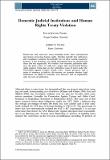| dc.contributor.author |
Emilia Justyna Powell and Jeffrey K. Staton |
| dc.coverage.spatial |
United States |
| dc.date.accessioned |
2016-01-07T15:21:33Z |
| dc.date.available |
2016-01-07T15:21:33Z |
| dc.identifier.uri |
http://desa1.cejamericas.org:8080/handle/2015/516 |
| dc.description.abstract |
Democratic and autocratic states routinely violate their international agreements protecting human rights. Scholars typically link ratification and compliance behavior theoretically but test their models separately; however, if the behaviors are jointly determined then we should treat them that way empirically. We consider how domestic judiciaries influence the joint choice to ratify and comply with international human rights regimes. Using data on the ratification status of states under the Convention Against Torture (CAT), states’ torture practices, and a series of measures of judicial effectiveness, we examine whether legal institutions are likely to constrain state behavior and by implication raise the costs of ratification. |
| dc.language.iso |
English |
| dc.title |
Domestic Judicial Institutions and Human Rights Treaty Violation |
| dc.ceja.source |
Fuente: International Studies Quarterly |

